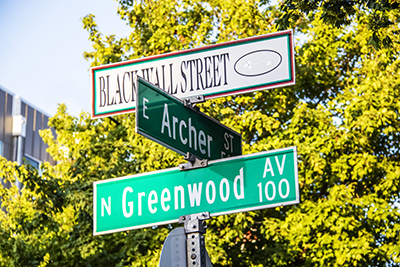A Black Seattle family couldn't bury their young son where they wished because of racism. 60 years later does an apology help?
In 1957, the Price family was kept from burying their son in an area reserved for white children in Evergreen Washelli Cemetery. 60 years later, the state Supreme Court apologized for its ruling.
Posted on January 19, 2021
 Six decades after the state of Washington compounded her family’s tragedy with insult and indignity, Bernice Price can only shake her head and sigh.
Six decades after the state of Washington compounded her family’s tragedy with insult and indignity, Bernice Price can only shake her head and sigh.
“Oh Lord,” Price, 90, says. “It’s been a long time.”
She gestures toward the alley behind the Leschi home she’s lived in for the better part of a century.
“Something happened during that time,” she says. “It’s gone.”
Sixty years ago, the Washington state Supreme Court ruled that a Seattle cemetery’s insistence on segregation outweighed Price and her husband’s right to bury their young son there. Last month, the Washington state Supreme Court admitted it was wrong.
Among Price’s family, which fought racist Seattle institutions in both this and another long-gone court case, there is no consensus on what last month’s reversal really means.
For a country in the midst of an unprecedented racial reckoning, the Prices’ story highlights questions that have reverberated around Seattle, around Washington and around the nation throughout this tumultuous season.
How do you reckon with racism that runs as deep as the country’s founding? How do you make amends?
What good is an apology that comes 60 years late?
“We cannot change it”
In 1957, the Prices’ son, Milton V. Price Jr., was out playing with his sister, Toni, in that alley behind their house. He was 3 1/2; she was 5. It was late August. A Wednesday. They had been picking blackberries. Their parents were painting the house. Some neighbors had just built a swimming pool. There was no fence around it. Milton Jr. wandered to the neighbor’s yard, fell into the pool and drowned.
Toni Price, now 69, remembers that day. The confusion. The deep end of the pool. “I couldn’t swim,” she said. The panic. Running back to the house. “Screaming, everyone was screaming.”
“He had only been gone about 10 or 15 minutes,” Bernice Price told a Seattle Times reporter at the time. She was silent a moment. Then she repeated, slowly, shaking her head. “Only gone just a few minutes.”
The day after their son died, Price and her husband called Evergreen Washelli Cemetery in North Seattle to make burial arrangements. She asked for a plot for Milton Jr. in a section of the cemetery for young children — “Babyland.”
The next day, when the Price family arrived at the cemetery in person, the cemetery employees realized they were Black. They were told “Babyland” was for whites only. The cemetery, which has since changed ownership, said it had made commitments to the owners of burial plots that “Babyland” would remain white only.
They were offered another section. They declined. Milton Jr. — Buster, as his family called him — was buried across town, at Lake View Cemetery.
The Prices sued the cemetery in King County Superior Court. They lost.
“The jury deliberated one and a half hours, their minds seemingly already made up,” wrote the Puget Sound Observer, a short-lived Black newspaper.
A state law, passed in 1953, which explicitly forbade cemeteries from denying burial based on race made no difference.
RCW 68.50.035 Unlawful to refuse burial to non-Caucasian.
It shall be unlawful for any cemetery under this chapter to refuse burial to any person because such
person may not be of the Caucasian race.
The family asked the judge to reconsider. They lost. They appealed to the state Supreme Court. They lost there, too.
A state Supreme Court justice, in a concurring opinion, gave an impassioned defense of the cemetery’s “right of segregation.”
“If Negro children were admitted,” Justice Joseph A. Mallery lamented, “its white exclusiveness would be gone.”
But just last month, in a case that had nothing to do with cemeteries or segregation or civil rights, the Washington Supreme Court sought to undo the damage it had done.
In a footnote, on page 13, the unanimous court wrote: “We take this opportunity to overrule this court’s opinion in Price v. Evergreen Cemetery Co. of Seattle.”
The 1960 decision, the 2020 court wrote, was both “incorrect and harmful” and was an example of “the unfortunate role” judges “have played in devaluing black lives.”
The court apologized. Sort of.
It’s become a mission of the state Supreme Court. In June, a few days after the killing of George Floyd by police in Minneapolis, the court wrote a letter to Washington’s legal community saying “that we all bear responsibility for this on-going injustice, and that we are capable of taking steps to address it.”
“Too often in the legal profession, we feel bound by tradition and the way things have ‘always’ been,” the court wrote. “We must remember that even the most venerable precedent must be struck down when it is incorrect and harmful. The systemic oppression of black Americans is not merely incorrect and harmful; it is shameful and deadly.”
A month later, the court corrected a 105-year-old wrong. In 1915, Alec Towessnute, a Yakama tribal member, was charged with fishing crimes, even though the tribe’s treaty with the United States allowed him to fish on its traditional grounds. The Supreme Court’s 1915 opinion in the case rejected “the premise of Indian sovereignty.”
Reading from the bench in July, Justice Raquel Montoya-Lewis, the court’s first Native American justice, said the court now unanimously repudiated the old case, “its language, its conclusions, and its mischaracterization of the Yakama people.”
“We cannot forget our own history, and we cannot change it,” Montoya-Lewis said. “We can, however, forge a new path forward, committing to justice as we do so.”
“Too little too late”
For Bernice Price, the apology comes a bit late. She still loves dancing, gospel music and Chinese food, but she struggles with dementia. It’s unclear what she understands of the court’s recent actions. Her husband, Milton V. Price Sr., died of cancer decades ago.
Much of Seattle’s Black community had banded together to help the Prices fight the case.
In 1958, just months after he arrived in Seattle to serve as pastor at Mount Zion Baptist Church, the Rev. Samuel McKinney wrote to his congregation asking for funds and support, even though the Prices attended a different church.
“The decision in the lower court was a flagrant violation of the spirit of this State’s anti-discrimination laws,” wrote McKinney, who over the next 40 years would become Seattle’s pre-eminent civil rights leader. He asked for $600 to cover printing costs for legal briefs and other procedural matters in the “history-making case.” McKinney and the Prices’ lawyer, Howard Pruzan, would become inaugural members of Seattle’s Human Rights Commission.
The effect of the ordeal on the Price family was profound.
“It really left us in limbo for a long time because I know that my parents didn’t want to bury him because they were counting on winning the case,” Toni Price said. “It was lots of sadness, lots of crying, lots of praying, lots of being in church, lots of people coming by and praying for us and hoping that there would be a change, and there never was a change.”
Toni Price remembers her parents getting a dog, a cocker spaniel named Duchess, to help occupy her as they were distracted by grief and the lawsuit.
“Every time they went to court they would come home and they would be very, very sad and very frustrated and they would talk about it for days afterwards,” she said.
Sixty years later, she is not impressed with the court’s apology.
She found out about it, like the rest of her family, after someone sent her a newspaper article. The state Supreme Court didn’t contact them.
“It’s too little too late, that’s what I think about it. That’s kind of it. I don’t even think it’s a weak apology, for all the damage that was done,” she said. “I really feel like it’s almost an insult, for them to have thought about doing something like that — we’re still in the same address, the same house — for them to not reach out and say anything to us about what they were doing. It’s an insult.”
Some of her younger siblings are more circumspect.
“Better late than never,” says Vernette Price, 56. “I’m glad my mother is still living to see it.”
“I would say I’m glad they’re self-reflecting, OK?” says Marcus Price, 59. “But, you know, I wish my dad was still here. Because the other side of that equation is my father was a police officer, responsible for the law, and he still couldn’t get justice for his child. So I wish my dad was here to at least hear that after 60 years they’re recognizing and apologizing.”
Seattle then, now
In some ways, they grew up in a Seattle very different from the one we live in today. Their parents bought their six-bedroom Leschi home with sweeping views of Lake Washington for $7,650 in 1952. Today it would go for well over $1 million.
In some ways, Seattle isn’t so different.
The Prices bought on the edge of Seattle’s Central District, where virtually the city’s entire Black population lived, forbidden from living in most other neighborhoods because of redlining and racially restrictive covenants. In 1960, 52% of the census tract where the Prices lived was Black. A couple blocks south, only 6% of households were Black. A few more blocks and the Black population was essentially nonexistent.
Today, the Black share of Seattle’s population is smaller than it’s been in 50 years, as housing prices and gentrification have forced longtime residents out of the city.
Marcus Price remembers being the only Black kid at McGilvra Elementary until the city started busing students to integrate schools in the early 1970s. School buses had their tires slashed. Parents pulled their kids out of school.
“I didn’t understand why some people were boycotting and there were signs in front of the school,” Price said. “It was interesting times back then.”
Today, the achievement gap between Black kids and white kids in Seattle Public Schools remains among the largest in the nation.
Another fight for justice
Marcus and Vernette Price were born after their brother’s death, after the court case was decided. But they lived through another legal battle, just a few years later, emblematic of how the city’s racism acted as a crucible in shaping their family.
For 20 years in the 1950s and 60s, Milton V. Price Sr., was a police officer, only the second Black sergeant in the history of the Seattle Police Department. He was raised in Seattle, and returned after serving in the Navy in World War II and spending two years at a historically Black college in Kentucky. He met Bernice while walking his patrolman’s beat.
In 1967, two of Milton Price’s colleagues were promoted from sergeant to lieutenant. Neither had the requisite experience, according to the city’s civil service rules. Both officers were white.
Milton Price Sr., who did have the required experience, was not promoted, despite what he said was a promise from the chief of police.
He went to court to get the promotion. Vernette Price remembers meetings at her parents’ house, with church and community leaders, “talking into the wee hours of the night and coming up with game plans.”
In court, the leadership of the Seattle Police Department blamed Price with nebulous, unfalsifiable and racist accusations.
Price was having “emotional problems” former Police Chief Frank Ramon said. They were “the result of problems in the black community,” the director of the department’s personnel division testified, according to news coverage at the time.
Milton Price Sr. won the court case and his promotion in 1969, but retired from the police department less than a year later, going on to run vocational programs at Garfield High School.
Toni Price remembers her father’s stories about other officers — his colleagues — telling racist jokes, trying to provoke him or put him in compromising situations.
“My father was treated horribly by the Seattle Police Department, so much discrimination, racism, and he was physically ill behind it, he almost had a breakdown,” Toni Price said. “I saw him several times sit in our family room, on the couch. I’d never seen my father cry before, but I saw him cry when he was with the police department, it was so terrible.”
Milton Price Sr.’s legal fight continued, even after he left the police department. It took another year of court battles to get his legal fees, $2,531.10, covered. He died just a few years later, at 51.
“A very symbolic effect”
The state Supreme Court’s latest actions can’t do anything to salve the wounds inflicted upon Milton Price Sr. They don’t do much for Bernice Price. Even for their children, they’re a mixed bag.
They see progress in this summer’s protests for racial justice, but also a haunting familiarity.
“We’ve been here and done this, this is a repeat of what we did in the ’60s and ’70s,” Toni Price said. “This country was supposed to be a democracy, but we’re still working on that, we’re still trying to get it together.”
But that’s not to say the court’s actions are futile.
Robert Chang, a professor of law at Seattle University School of Law, runs the university’s Korematsu Center for Law and Justice, named for the protagonist in one of the most egregious court decisions of the 20th century, upholding Japanese incarceration camps.
For Chang, it’s never too late. These cases are forever, he says, and admitting past wrongs reminds us of who we are.
Northern states, Chang says, often see themselves as separate, or apart from the Jim Crow South, even as their histories are marked by events that weren’t so different.
“Having that acknowledged has a very symbolic effect that extends far beyond the family,” Chang said. “It acknowledges that this is what Washington was. And then we can ask the question, ‘How far have we really come?'”
David Gutman: 206-464-2926 or dgutman@seattletimes.com; on Twitter: @davidlgutman.
SEE ALSO:
More Race Relations Articles
Sexual Bias Articles
Mental Health Articles
How Drugs and Alcohol Affect the Brain and Body
WA. Counselor Directory: find a therapist near you
How helpful is this web page to you?
(and how can we can improve this page for you?)
not helpful
very helpful
Other Articles
Is Holocaust Denial a form of Anti-Semitism and Hate Speech?
Facebook bans Holocaust denial, distortion posts
Facebook is banning posts that deny or distort the Holocaust and will start directing people to authoritative sources if they search for information about the Nazi genocide. Facebook CEO Mark Zuckerberg... read more
Seattle-area families of color are talking about improving remote education.
Here are some of their ideas.
Education Lab is a Seattle Times project that spotlights promising approaches to persistent challenges in public education. It is produced in partnership with the Solutions Journalism Network and is fun... read more
The Tulsa Race Massacre Happened 99 Years Ago.
mob destroys 35-square-blocks of the black community, 300 killed, 8,000 left homeless
Last year, the HBO series ‘Watchmen’ depicted the Tulsa Race Massacre, one of the worst outbreaks of racial violence in American history, in its series premiere. The Tulsa Race Massacre ... read more
What state entered the Union in 1859 - as a white's only state?
Original Oregon state constitution banned slavery, and also excluded nonwhites from living there.
In 1844, all black people were ordered to get out of Oregon Country, the expansive territory under American rule that stretched from the Pacific coast to the Rocky Mountains. Those who refused to leave c... read more


.jpg)


